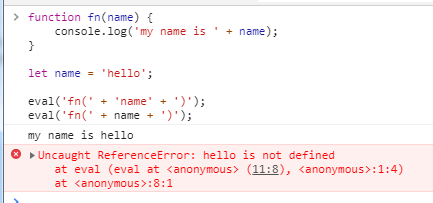let a = 1,
b = 2,
c = 3;
let arr = [a, b, c];
function test(p1, p2, p3) {
console.log(`${p1} ~ ${p2} ~ ${p3} ~ `);
}
test(...arr); //1 ~ 2 ~ 3 ~
eval(`test(${arr})`); //1 ~ 2 ~ 3 ~ 这里等价于eval(`test(a,b,c)`)
test(arr); //1,2,3 ~~~ undefined ~~~ undefined ~~~
test(arr.toString()); //1,2,3 ~~~ undefined ~~~ undefined ~~~ 这个等价于test('1,2,3')
eval('context.fn(' + args +')') args=['arguments[1]','arguments[2]',...]
数组的展开效果与 eval 无关,是隐式类型导致的,我们来看一个例子:
console.log('1' + [1, 2, 3]) // 11,2,3
function fn(name) {
console.log('my name is ' + name);
}
let name = 'hello';
eval('fn(' + 'name' + ')'); //my name is hello
eval('fn(' + name + ')'); //Uncaught ReferenceError: hello is not defined

